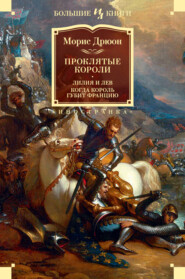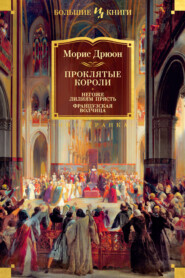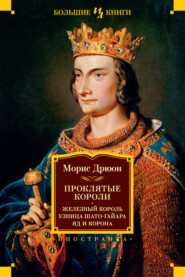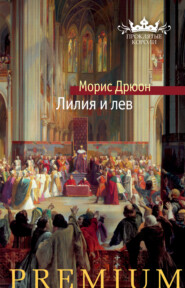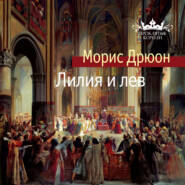По всем вопросам обращайтесь на: info@litportal.ru
(©) 2003-2025.
✖
The Lily and the Lion
Автор
Год написания книги
2019
Настройки чтения
Размер шрифта
Высота строк
Поля
LOUIS V OF BAVARIA.
THE KING OF BOHEMIA:
JOHN OF LUXEMBURG, son of the Emperor Henry VII of Germany.
THE KING OF NAPLES:
ROBERT OF ANJOU-SICILY, called the Astrologer, uncle of King Philippe VI of France.
THE KING OF ARAGON:
ALFONSO IV.
THE KING OF HUNGARY:
LOUIS I, the Great.
THE POPES:
JOHN XXII, formerly Cardinal Jacques DUÈZE, BENEDICT XII (from 1334), formerly Jacques FOURNIER, called the White Cardinal.
JAKOB VAN ARTEVELDE, leader of the Flemish League.
COLA DI RIENZI, Tribune of Rome.
SPINELLO TOLOMEI, a Sienese banker.
JEAN I, THE POSTHUMOUS, called GIANNINO, son of Louis X, the Hutin, and Clémence of Hungary, pretender to the throne of France.
The Lily and The Lion (#ulink_9a13a193-8ca1-568b-a265-16f6752f4e32)
Mahaut, Countess of Artois, was in a very bad temper all the way home.
‘Did you hear what that great fool we’re unlucky enough to have for King said? He expects me to give up Artois, just like that, and merely to please him! The very idea of making that great foul Robert my heir! My hand would wither away before it signed a thing like that! They’ve clearly been accomplices in roguery for a long time past and owe each other a lot! And to think that if it weren’t for my having cleared the path to the throne …’
‘Mother …’ Jeanne murmured in a low voice.
If she had dared to say what she thought and had not been afraid of a savage rebuff, Jeanne would have advised her mother to accept the King’s proposals. But it would have done no good.
‘He’ll never get me to agree to that,’ repeated Mahaut.
Though she did not know it, she had signed her death-warrant; and her executioner was sitting opposite her in the litter, looking at her through her dark lashes.
PART ONE (#ulink_d17a3a55-3e36-5ea2-954f-05e389a1a539)
THE NEW KINGS (#ulink_d17a3a55-3e36-5ea2-954f-05e389a1a539)
1. (#ulink_5d2aa461-99af-57ef-8842-59670da23591)
The January Wedding (#ulink_5d2aa461-99af-57ef-8842-59670da23591)
FROM BOTH SIDES of the river and from every parish in the city, from St Denis, St Cuthbert, St Martin-cum-Gregory, St Mary Senior and St Mary Junior, from the Shambles and from Tanner Row, the people of York had been flowing for the past two hours in a continuous stream towards the huge but still-unfinished Minster that brooded heavily over the city.
The crowd completely blocked the two winding streets of Stonegate and Deangate which led into the yard. Boys, who had found perches above the crowd, could see nothing but a sea of heads covering the whole area. Burgesses, tradesmen, matrons with their numerous broods, cripples on crutches, servants, apprentices, hooded monks, soldiers in shirts of mail and beggars in rags were all crowded as close together as the stalks in a truss of hay. The light-fingered pickpockets were reaping a year’s harvest. Faces filled the upper windows like so many bunches of grapes. The damp, cold, misty twilight that enveloped the great building and the crowd standing in the mud seemed scarcely that of noon. It was as if the gathering was pressing close together for warmth.
It was January 24th, 1328, and, in the presence of William de Melton, Archbishop of York and Primate of England, King Edward III, who was not yet sixteen, was marrying his cousin, Madam Philippa of Hainaut, who was barely more than fourteen.
There was not an empty seat in the cathedral. They had all been reserved for the high dignitaries of the kingdom, members of the upper clergy and Parliament, the five hundred invited knights and the hundred tartan-clad Scottish nobles, who had come south to ratify the Peace Treaty. Soon the solemn mass would be celebrated, sung by a hundred and twenty choristers.
Now, however, the first part of the ceremony, the marriage proper, was taking place outside the south door of the cathedral in view of the people, according to the ancient rite and peculiar custom of the archdiocese of York, as a reminder that marriage was a sacrament between husband and wife, affirmed by mutual vows taken in public, to which the priest was merely a witness.
The mist had stained the red velvet of the canopy over the door with patches of damp, it had condensed on the bishops’ mitres, and had bedraggled the fur about the shoulders of the royal family assembled round the young couple.
‘Here I take thee, Philippa, to my wedded wife, to have and to hold, at bed and at board …’
Coming from the King’s young lips and beardless face, his voice was surprisingly powerful, clear and vibrantly intense. Isabella, the Queen Mother, was struck by it, and so were Messire Jean of Hainaut, the bride’s uncle, and the others standing near, such as Edmund, Earl of Kent, and Wryneck, Earl of Lancaster, Chief of the Council of Regency and the King’s tutor.
The barons had heard their new King speak with such unexpected force only once before – on a day of battle in the last Scottish campaign.
‘… for fairer for fouler, for better for worse, in sickness and in health …’
The whispering of the crowd gradually subsided; silence spread like a circular ripple and the royal young voice rang out above those thousands of heads, audible almost to the far end of the yard. The King slowly recited the long vow he had learned the previous day; but he might have been inventing it afresh, so clearly did he articulate each phrase and lend each word grave and profound significance. It was like a prayer said once, and destined to last a lifetime.
The boyish figure seemed endued with the mind of a man supremely sure of the vow he was taking in the face of Heaven, of a prince conscious of the part he had to play between his people and his God. The new King was taking his family, his friends, his great officers of State, his barons, his prelates, his people of York and, indeed, of all England, to witness the love he was vowing to Madam Philippa.
Prophets burning with the zeal of God and leaders of nations who are imbued with some unique conviction can infect the crowd with their faith. A public affirmation of love also has this power, and can make everyone share one man’s emotion.
There was not a woman in the crowd, whatever her age, whether she was newly married, was deceived by her husband, was a widow, a virgin or a grandmother, who did not feel herself at that moment to be standing in the bride’s place; and there was not a man who did not identify himself with the young King. Edward III was uniting himself to every woman among his people; and it was his whole kingdom that was taking Philippa to wife. The dreams of youth, the disillusionments of maturity, and the regrets of old age were all centred on the young couple – heartfelt offerings. And, when darkness fell in the ill-lit streets, the eyes of betrothed couples would glow brighter in the night, and husbands and wives, who had been long at enmity, would reach for each other’s hands when supper was done.
From the beginning of time people have crowded to the weddings of princes, in order to enjoy a vicarious happiness which, when seen in the highest, must seem perfect.
‘… till death us do part …’
There was a lump in every throat; a vast, sad, almost reproachful sigh rose from the crowd. At such a moment, there should be no mention of death. Surely this young couple could not be mortal or subject to the common lot?
‘… and thereto I plight thee my troth …’
The young King heard the people sigh, but he did not look at them. His pale blue, almost grey eyes, their long lashes raised for once, were gazing at the chubby, freckled little girl, wrapped in veils and velvets, to whom he was making his vows.
Indeed, Madam Philippa was not at all like a princess in a fairy story; she was not even very pretty, for she had the heavy features, short nose and freckles of the Hainauts. Nor was she endowed with any particular grace of movement; yet she had an attractive simplicity and made no attempt to assume an air of majesty, which would certainly not have become her. Without her royal adornments, she would have looked no different from any other red-headed girl of her age; there were hundreds like her in every one of the northern kingdoms. But this merely increased her popularity with the crowd. Though she was the elected of Fate and of God, she was essentially no different from the women over whom she was to reign. Every stout, red-headed girl felt that she had, somehow or other, been personally complimented and honoured.
Trembling with emotion, Philippa screwed up her eyes as if unable to bear the intensity of her bridegroom’s gaze. All that was happening to her was so incredibly wonderful: the coronets about her, the mitres, the knights, the ladies she could see within the cathedral, row on row of them behind the candles, like souls in Paradise, and all the populace there below her! Indeed, she was to be Queen and, what was more, Queen by a love-match.
Oh, how she would cherish, serve and adore her fair and handsome prince, who had such long eyelashes and such slender hands, and who had come so miraculously to Valenciennes twenty months ago with his exiled mother, seeking help and refuge. Their parents had sent them out to play in the garden with the other children; and they had fallen in love. And now that he was King, he had not forgotten her. How happy she would be to devote her life to him. Her one fear was that she was not beautiful enough to please him for ever, nor clever enough always to be a help to him.
‘Madam, put out your right hand,’ said the Archbishop.
Philippa at once put out her little dimpled hand from her velvet sleeve, holding it firmly, palm upwards, fingers spread.






